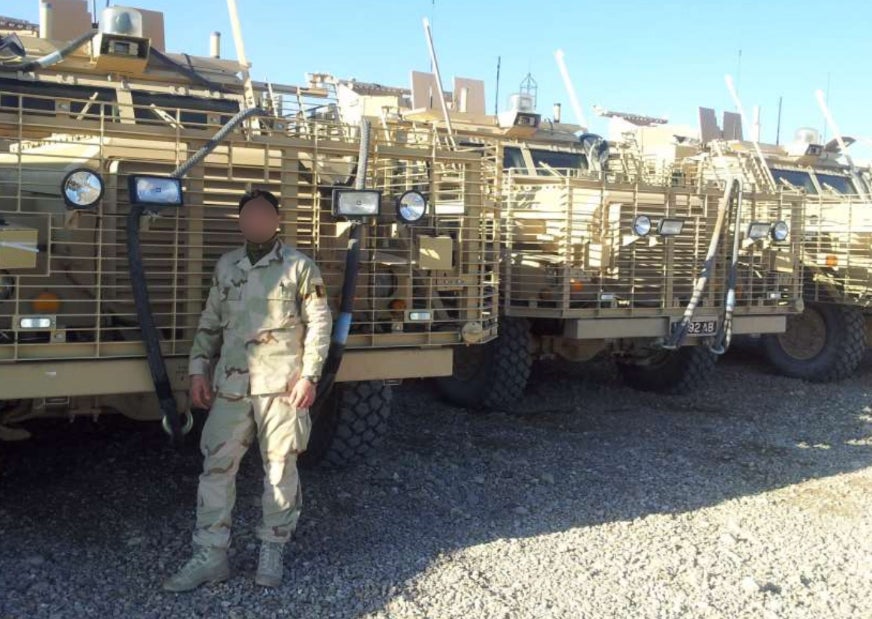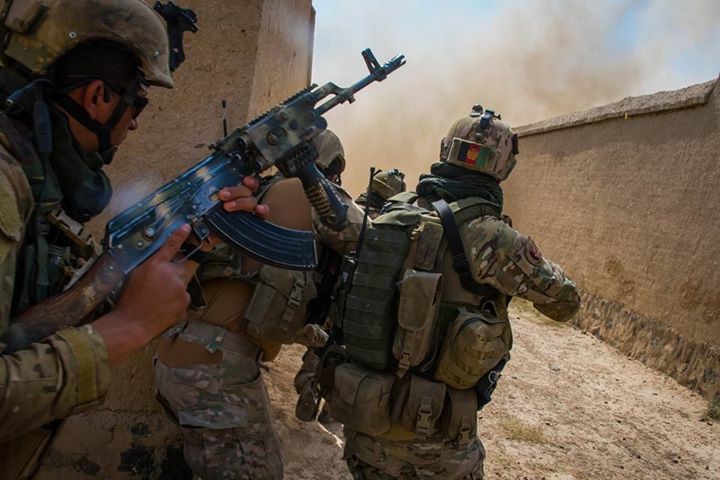For Ghulam, it began with a form handed to him by a colleague, offering him a way out. For more than 12 years, he had been part of an elite troop of Afghan special forces set up, trained and paid by the British government. Now, after being forced to flee the Taliban and leave his homeland for Iran, he worked long days in a recycling factory and had to evade police because of his undocumented status.
The fellow Afghan who gave Ghulam the form knew of his military background and thought he might be open to an offer. For some in Ghulam’s situation, a form comes first; for others, it’s contact by phone from other Afghan veterans. Some have been approached face to face. However it’s done, and whatever the terms, the offer to these elite UK-trained commandos is broadly the same: come to fight for Vladimir Putin’s Russian forces against Ukraine.
Ghulam was part of Afghan Territorial Force (ATF) 444 which, along with sister unit Commando Force (CF) 333, were set up by the British in the 2000s. Known as the “Triples”, they fought shoulder to shoulder with UK troops against the Taliban. That association has put these troops at risk since the Taliban regained control in 2021 and, although the UK government is now reassessing decisions to deny thousands of them sanctuary in the UK, progress is slow. Many are living in fear, with little or no communication on their future from the Ministry of Defence. An investigation by The Independent, in collaboration with investigative newsroom Lighthouse Reports and Afghan news outlet Etilaat Roz, has found that, while the Triples’ wait in limbo goes on, Britain’s adversaries are circling.
Putin’s war in Ukraine, now approaching its third anniversary, has been long and costly for Moscow, with conscriptions of civilians and even convicts called up to serve, sent into Ukraine’s eastern front that has become known as the “meatgrinder”. Casualties on the Russian side are now thought to top 700,000, with more than 100,000 estimated dead. As Russia looks further afield, Cubans, Syrians, Indians and most recently North Koreans have been roped into the war.
Keir Giles, senior consulting fellow on Russia and Eurasia at think tank Chatham House, said Afghans with elite combat experience would “obviously be attractive” to military recruiters. He said: “Russia is trying to exhaust every possible source of live bodies for the armed forces short of full-scale mobilisations.
“You have a situation where the loose coalition of countries backing Russia: namely Iran, North Korea and China, will be content to find ways to assist Russia in its war on Ukraine.
“We’ve already seen this turn into manpower assistance in the case of North Korea. It should not be surprising if this pattern spreads to other countries, particularly if it is a deniable involvement, such as for example Iran providing assistance with recruiting third-country nationals from Iran.”
Speaking to 14 former Triples inside Iran, as well as dozens more in Afghanistan, we have established that there was an initial wave of recruitment offers to Afghan ex-military personnel in 2023, followed by a second wave earlier this year.
We have seen a number of apparent recruitment forms, including the one given to Ghulam, that have been circulated among Afghan veterans in Iran. The forms, which are written in Dari, ask for personal details and contact information.
One form also asks: ”What is your knowledge of military affairs and being a soldier?” and, ”What is your military expertise?” The form then asks the applicant what level of education they have and whether they have a driving licence.

Ghulam, who was arrested by Iranian police and deported to Afghanistan before he could decide whether to take up the offer, was told a former Afghan general was leading the recruitment and the next step would be an interview to assess his experience.
Some former special forces soldiers in Iran said they were approached for recruitment initially by contacts within the former Afghan army or security forces over the phone; others said Afghan people smugglers approached them in person. One former army doctor, Musharaf, said he got as far as meeting Russians from the embassy in Tehran face-to-face about the recruitment.
Musharaf claimed he had represented a few hundred former special forces soldiers in negotiations. “I would go to the Russian embassy to talk to Russian officials regarding the recruitment process,” he explained. “We decided to go together with these 200 special forces to Russia. We thought wherever we can be fed, that’s where we can live. We were forced to do this because life here in Iran is very difficult.
“I was talking directly with Russians and they agreed to pay $3,000 [£2,370] per month.”
He said everything was “ready to go” when he spoke with his former boss in the Triples units who advised him it would not be a good decision. At this point, he said, he decided not to go, and those he had recruited followed suit.
Musharaf said friends of his had been recruited this year, given visas through Moscow’s embassy in Tehran. “I know that some people have gone through their programme to Ukraine,” he said, although he was unable to provide evidence to prove this.
Hamid, who became a training officer during a 13-year career in ATF444, said that during 18 months in Iran working as a construction worker, he was approached three times by Afghan middlemen offering him a job fighting for Russia.
He said the offer came earlier this year: “First I was approached two times in a week, and then a month later I was approached again. The people making the approaches were Afghans who are human traffickers or contractors. They are the kind of people who take you across borders to a different country.
“They said there are Afghans who are currently in Russia who have been recruited and my job would be to go there and train them professionally. I don’t know anything about what happens in Russia because I told them clearly that I did not want to do it. I’m not going to do anything like that again, any battles or missions, especially for another country.
“I have high hopes that I will be relocated by the UK and I will stay loyal to the British.”
While none of the Triples we spoke to took up the offer, the situation for Afghans in Iran is becoming more and more hostile. The Iranian government plans to deport around two million migrants, the majority of them Afghan, by March and new restrictions cull any of the limited freedoms that Afghans had. Increasingly the choice these Triples face is to take up an offer to fight or be sent back to their homeland where they and their families will have to face the Taliban, who have beaten, tortured and killed dozens of them since August 2021.
While this goes on, the process of reviewing rejected applications to the Ministry of Defence’s relocation scheme for Afghans who worked closely with British troops has been beset by delays. In February, the MoD announced that it would review around 2,000 rejections from the Afghan relocations and assistance policy (Arap) within 12 weeks, following revelations in a joint investigation by The Independent, Lighthouse Reports and Sky News last year that hundreds of Triples had been refused under the scheme. Government ministers have said that they estimate one in four of the applications reviewed will be overturned.

But nine months on, the review is still ongoing. In October, armed forces minister Luke Pollard admitted that the delay has been a “source of deep regret” and that “it should not have taken this long”.
The government has said that more than three-quarters of the applications have now been reassessed, and positive decisions have started to receive sign-off by Pollard.
However, applications deemed ineligible by the review will not be informed. In fact, the UK government has decided to not even tell the Afghans whose applications are under review that their cases are being reconsidered.
Instead, the Triples in Iran and Afghanistan must continue living in fear, unable to have a normal life in their homeland, hoping they will be one of the estimated 500 told they can come to safety in Britain.
In the meantime, Rafi Hottak, a former Afghan interpreter, who is in touch with former Triples in Iran, said he had been told about Afghan former special forces officers being gathered together in meetings about fighting for Russia.
“The MoD needs to speed up the review process,” he said. “They need to look at this not purely on the numbers, but also as a responsibility. These are the people who stood by us, did what was necessary. Today they have no land, no country to go back to.”
An MoD spokesperson said: “As the minister for the armed forces made clear recently to parliament, we understand the frustration that the review is taking so long.
“Key issues within the review have been resolved and we are working hard to ensure that eligible former Triples and their families can move to start a new life in the UK.”
“The ‘Triples review’ remains high priority for the government and ministers have directed that it is delivered quickly, and with the care and diligence that it deserves.”
A former member of the UK military, who served with the Triples in Afghanistan, warned many were close to breaking point. They said: “They [the Triples] know exactly how the UK does business from intelligence gathering to specialist military operations. There’s a lot of knowledge that has been shared over the 20 years we worked shoulder to shoulder.
“Despite the promises that have already been broken, the Triples remain loyal to the UK. However, with many barely surviving, in destitution and fear, there will come a point where they can wait no longer.”
Names have been changed to protect the identities of former Afghan military personnel, who spoke on condition of anonymity.







